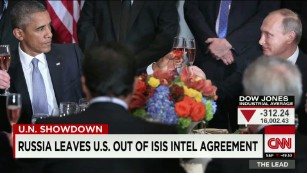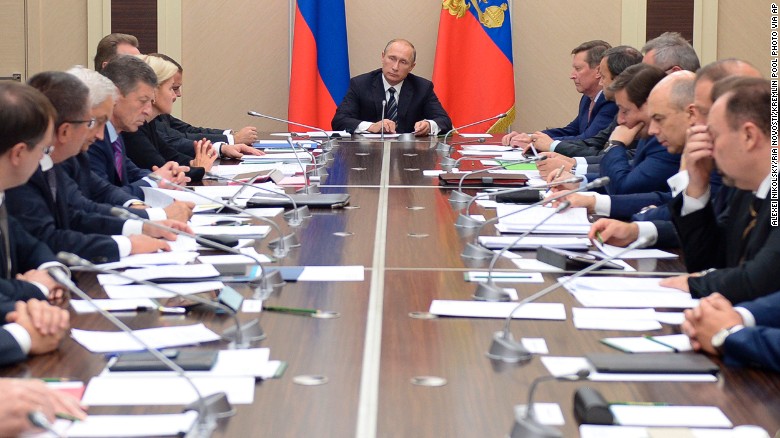Putin's playbook in Syria draws on Ukraine and loathing for revolution
Did his experience in Ukraine tempt Vladimir Putin to begin Russia's Syrian expedition? Are they both examples of the Kremlin taking advantage of Western hesitation or caution? Or are they two episodes (with more to come) of Russia taking revenge for previous humiliations (Kosovo, Iraq, Libya, etc.) and reasserting itself as a Great Power?
Do we yet have any idea what the Russian President's endgame is? Is he a master strategist or a cunning magician disguising Russia's relative decline? Russia's sudden and forceful intervention in the four-year Syrian conflict poses plenty of questions.
Comparisons of events in Ukraine and Syria should not be overdone. The circumstances and the geography are different. In Syria, the Russians were invited in by a government; in Ukraine most certainly not. In Syria, Russia is projecting power and trying to influence the shape of the Middle East; in Ukraine, it is acting in its backyard. Last year, Putin even asserted of Ukraine: "We are one people. Kiev is the mother of Russian cities."
In Syria, the intervention is overt and trumpeted as Russia deploys the best of its air force; in Ukraine, it is denied with a shrug as Moscow relies on surrogates with varying degrees of discipline.
Obscure intentions
Even so, Russian intentions in Syria and Ukraine do seem part of a pattern. Russia is trying to help allies strengthen their bargaining position while being less than clear about its own role and ends. In Syria, for example, Putin has spoken about the war against ISIS, but Russia's target list clearly includes any of Syrian President Bashar al-Assad's opponents that threaten the regime's heartland.

Obama and Putin face off at U.N.
At the United Nations, Putin waxed lyrical about taking on the threat of ISIS. On Sunday, Russian officials spoke of hitting ISIS positions in the province of Idlib, where ISIS has no presence.
And it's not clear yet whether Russia's priority is to help the Syrian regime go on the counterattack or guarantee access to the Mediterranean for its military in a post-Assad chunk of Syria on the coast.
In Ukraine, Moscow is sustaining the rebels with equipment and supplies to enable them to hold big chunks of the Donbass, while denying that it is involved in their revolt. Some see the ultimate aim as annexation (de facto or formal) of eastern Ukraine and its heavy industry; others a sort of collar to be tugged anytime President Petro Poroshenko cozies up to the European Union or NATO.
For now, that second aim seems more likely. Putin seems reluctant to invite more U.S. and European sanctions by upping the ante, and he said last week there was hope the Ukrainian crisis "can be dealt with." Some rebel leaders in eastern Ukraine are suggesting eastern Ukraine might fall into some sort of limbo, like Russian enclaves in Georgia and Moldova.
Moving on
To some analysts, it's no accident that the arrival of the Russian air force in Latakia coincides with much quieter times in eastern Ukraine, where a ceasefire is holding. Maybe it was time to change the sheets or, as Edward Lucas of the Center for European Policy Analysis puts it, end the soap opera in Ukraine.
"The heroic separatists, their evil fascist foes, and the cynical Western meddlers have been retired," to be replaced by "a thrilling and exotic epic set in Syria," he writes in Politico.
To Ulrich Schmid, a professor of Russian history at St Gallen University, Putin's appeal to Russian patriotism needed a shot in the arm. "Putin wants to refill the tank of national pride with new fuel," he told CNN.
The tank was last full in March 2014, as the Russian flag was raised in Crimea. Putin told the Russian parliament that "it was only when Crimea ended up as part of a different country (in 1992) that Russia realized that it was not simply robbed, it was plundered."
He recalled NATO's expansion into the Baltic states. "They kept telling us the same thing: 'Well, this does not concern you.' That's easy to say," he said to rapturous applause.
It was a theme he returned to at the U.N. General Assembly last week, saying that those who created "this Middle East situation ... have never abandoned their policy, which is based on arrogance, exceptionalism and impunity."
Putin nurses a sense of historical grievance. He complained last year that the United States and its allies "act as they please: Here and there, they use force against sovereign states, building coalitions based on the principle 'If you are not with us, you are against us.' "
As a KGB officer in Dresden in 1989, Putin saw the East German state overthrown. He saw Russia's ally in Ukraine, Viktor Yanukovych, flee in the face of the Maidan protests. He had a visceral loathing of the "color-coded" revolutions, which he saw as stirred up by the West. To Putin, the Maidan protesters were "terrorists." To al-Assad, all the rebels in Syria are "terrorists." So when al-Assad told a Russian diplomat last year that he was no Yanukovych and would be sticking around, it may have struck a chord in the Kremlin.
To put in crudely, this is payback. When Putin was Prime Minister in 2011, he fulminated against the West's no-fly zone in Libya, which started as a humanitarian mission but later turned the tide against the Gadhafi regime. He mocked it as "a medieval call for a crusade."
Today, the deployment of Russian anti-air missiles and Su-30 interdiction fighters in Latakia demolishes any chance the coalition has of enforcing a no-fly zone in northern Syria free from al-Assad's barrel bombs. It would just be too dangerous.
The Kremlin opportunist
Some analysts see Putin as an opportunist, aware of Russian military and economic shortcomings but willing to take advantage of a vacuum or others' hesitation. Before moving to take Crimea, he knew the Ukrainian military was in a dire state and Kiev almost bankrupt. He was confident the United States and NATO would huff and puff but not dare to challenge him. The stakes were not high enough.
The same calculation applied to the rebellion in eastern Ukraine. Talk in Western capitals of arming the Ukrainians with offensive weapons such as missiles capable of taking out separatists' Russian tanks came to nothing. Sanctions were the preferred option -- cautious but eventually damaging.
Similarly, the failure of the West to stand up moderate opposition to al-Assad, its reluctance to engage capable Islamist groups such as Ahrar al Sham and help them take the battle to the regime, provided Russia with an opportunity to reshape the battlefield. Again, Putin calculated the West would and could not resist Russia's intervention. Was the U.S. likely to bomb the runway at Latakia?
The downside
However, some observers predict that Russia's expedition in Syria could become the sort of messy and indecisive commitment that Ukraine has become, without a timetable or resolution.
Some Russian politicians have predicted that the bombing campaign will last three or four months, with the aim of ensuring the Assad government has a contiguous belt of territory linking Damascus and Alawite strongholds on the coast.
Easier said than done: Al Nusra and its allies are used to dealing with aerial bombardment, and the weather will deteriorate as winter approaches, making airstrikes more difficult. The closest rebel positions are barely 25 kilometers (16 miles) from Latakia.
The Russian presence will be enticing to Chechen fighters already in their hundreds in Syria; if Russian facilities suffer suicide bombings, does the Kremlin double down or withdraw? In that respect, the risks are greater in Syria than in Ukraine.
Russian overreach?
The optimists (and some cynics) among Western analysts and officials even welcome the Russian expedition in Syria and compare it to its inconclusive support for the separatists in Ukraine. They argue that both are expensive (especially for a country in deep recession) and beyond Russia's capacity to win. Russia will end up weaker, not stronger. And eventually, they say, a post-Putin Russia will be more realistic about the use of military means to achieve Moscow's goals.
In other words: "Let him get on with it, and he'll see how tough it is." This argument sees Russia already stuck with subsidizing eastern Ukraine, which would otherwise be bankrupt, and propping it up with bureaucrats drafted from Moscow. All the while, reforms introduced in Kiev, supervised by the International Monetary Fund and supported by the U.S. and European Union, will eventually put Ukraine back on its feet.
The optimistic argument continues that Putin can play the tough, decisive leader and "refuel" Russian patriotism, but can't make Russia's underlying rot go away. The oil price has collapsed, investment is at its lowest in two decades, and real incomes have declined 10% in the last year, according to the Russian Federal Statistics Service. Putin is more the magician than the strategist.
Others think this is too rosy a perspective.
Swift and ruthless
Putin "does not worry about Russia's long-term economic health," writes Edward Lucas.
"He sees politics as a ruthless zero-sum game in which victory goes to the player with the strongest nerves and fastest movements."
The Russian President can move fast because he has absolute control of the political process. The Upper House of the Duma is guaranteed to rubber-stamp the Kremlin's use of military forces (it has for Crimea and Syria). By contrast, the Washington interagency bureaucracy and powerful voices in Congress restrain an already cautious President.
As veteran Russia-watcher Mark Galeotti put it weeks after Crimea was seized, Putin "is listening to fewer dissenting voices, allowing less informed discussion of policy options, deliberately narrowing his circle of counselors.
The process is opaque to the point of invisible.
So there is one way in which Russian actions in Ukraine and Syria are identical. In neither case can we guess what the goal is.
News Courtesy: www.cnn.com











